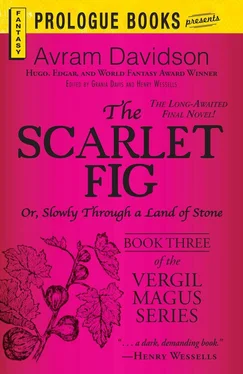The canny corn-factor evidently lost his senses as he gained the Crown, and, once having mounted the Elephant Throne, that ugly, elephant chair which symbolized Roman dominion over Asia and Africa and — counting the small herd descended from Hannibal’s elephants, which had ever since been eating its way through the Pontine Forests — Europe; at once began to play the fool. None of his japes and follies more shocked the people than his sending a loud and gaudy procession to the Nine Roses (who existence was supposed to be quietly and politely ignored) asking “humbly” for “advice.” Mention of the Roses always brought to Vergil something which was not exactly a vague memory: the phrase The Death of Rome and the odd, alliterative syllables, Atilla Totilla Bobadilla [15] — From The Notebook of Vergil Magus , “There is, ser, Atilla King of Huns. There is, ser, Totilla King of Goths. Tis our hope that they may never meet, and it may well be, we hope, that they three may not know who they are — that is, they know of course their names and crowns and tides, but — what, ser? Ah, yes to be sure, ser. Afilla King of Huns. Totilla King of Gotha. And Bobadilla King of Saracens. (Thus the bygone babble, bo bo to to bil til a til bo bo to.) You shoudl be a man well-larned in occamy ser. And you know well of three substances which should never meet. In that secret science we all know that one means a certain thing when one says the king. And so on. just so, ser, we must hope that these three kings must never meet. They be the Death of Rome, ser. The Death of Rome …” Unspoken: should they meet they must realize their combined strength; realize, to, that ancient saw, the enemy of my enemy is my friend (dean no. 16–17).
, which made no sense: being a mage sometimes informed him not only of morethan he wanted to know but of more than (sometimes) he knew at the time of being informed.
A reply to Latulus did come — inscribed in the ink of a scuttlefish on the much-scraped skin of a bidens, a lamb struck by lightning and which thus had never known the butcher’s knife — cooly containing the single word Delphos. Latulus struck his pumply forehead with the flat of his warty hand … no one had ever been able to dismiss Latulus contemptibly as “just another pretty boy” (this he well-knew, and, “Was Socrates comely?” he asked; “Was Æsop?” — rhetorical questions which would have had more force if it had not been generally known that Latulus believed Socrates had told fables and that Æsop had stolen the Golden Fleece) and cried Of course! why had he not thought of that himself ? “It was because he did not have the time,” murmured Vergil in Quint’s ear, referring to the Emperor’s well-known habit of assigning preposterous and impossible tasks (draining the Putrid Sea, for example; or turning the Adriatic into a carp-pond), invariably adding, “I would do it myself, if I had the time …” Quint snorted, and even, for a moment, left off rubbing his eyes.
Off went the rich gifts — chauldrons of gold filled with gold coins; back came the Oracular answer, reducing the single word of the beloved women to a single letter, phi. Faster than fire the news spread, and in a trice the Emperor — who, alas, did have a notoriously bad digestion — became know as Flatulus. It took much to erode the immense dignity of the Imperial Office; and the final blow which slpit that great rock was a Decretal forbidding “the issuance or utterance of vulgar sounds or noises when Himself the August Caesar passed by.” The usually subservient Conscript Fathers of the Senate immediately convened, and, first, ordered the Imperial Guard to discharge their allegiance to the present Himself, on pain of not being paid the customary gift at honorable discharge of a farm (invariably someone else’s farm, but what would you?); and, second, ordered Phlatulus the choice of abdicating, committing suicide, or being whipped from the throne with an eel-skin. The man was of noble family, he did behave like a child, and the ancient republican law (never amended or repealed) provides that this was the only instrument with which the magistrates — of whom the Senate was the highest order — might publicly flog a boy of the Blood. Petulantly but promptly, and farting indignantly, the Emperor abdicated; and retired to one of his innumerable and private estates, whence he did — having so little dignity — from time to time return to Rome under cover of one of the numerable legal reasons for doing so: to consult a physician or an astrologer, to offer sacrifice at one of the temples found only in Rome (Juno of the Two-Headed Heifer, for example, a goddess much favored by the simple … or simple-minded … and pious farmers of the days of King Numa, but whose cultus was by now shrunk to almost nothing nothing and whose temple was little more than a mud hogan crouched under the portico of the Inspection Entrance of the Cloaca Maxima, of which perhaps Vitruvius had said that it — the Cloaca Maxima, Rome’s chief sewer — was in the aggregate as massive as the Pyramids, and infinitely more utile. The pilgrimages, if such they could be called, were very much welcomed by the temple’s priest, who otherwise depended for sustenance upon his small plot of samphire, which his wife hawked in the streets out of two larg jars — one sort in pickle, with garlic and onion, and one sort in brine, without, the old priest-farmer, when asked if this were not a dreadful trade, denied with emphasis that samphire could only be found flourishing in the clefta of cliffs; he called this a vulgar superstition, and he said that it grew as well upon the level land as would so many cucumbers. Nevertheless he was very glad to receive the worship and the offerings of the former Emperor, and, indeed, had some notion that it was compulsory for those in that status; and muttered very complimentary things about the Pax Romana. But these pelrinages were made rather furtively, and in a closed litter, for the populus took much joy in greeting their late liege with jeers, hoots, poots, and other manner of vulgar sounds and noises; until, finally, he gave them up altogether, and crossing o’er the perfumed sea, confined his urban trips to Messina, Palermo, Syracuse, on that tri-cornered island, where, even if he no longer owned a half of it, he was received with respect. But, after no great passage of time, he, still acting the clown, tripped and fell into one of hsi own eel-ponds and vanished or dissolved at once in a flurry of blood drawn by those ferocious teeth, and only his ring, found by draining the pool and slaying and examining each eel, every single eel) remained to identify him. Their flesh was offered to the slaves, who, one and all, refused to eat of it.
The then-Emperor ordered five minutes of official mourning.
After that, no one sent messages overtly to the Nine Roses of Rome, who were left, unvexed, to continue, at intervals, and covertly, their apotropaic activities against The Death of Rome. Leaving to sound and resound in Vergil’s min the meaningless and yet, somehow, fearsome syllables, Attilla Totilla Bobadilla … and, like an echo of a drum-beat, the final syllables: ilia … ilia …
“This fire which Cumus is said to kindle,” began Quint, interrupting his friend’s echoes.
“Not ‘said to,’” Vergil corrected. “He does. I have seen him do it. Twice. Once at the extinguishing and re-lighting of the lamps in the adyt of the Temple of the Magna Mater. And once, when that great storm of the Consulate of Peppin blew out the torches in the Oratory of Orpheus; that was rare music, and the Head sang so —”
“Rarely, I am sure,” said Quint in his best languid manner. “But I wanted to ask you about the fire …?”
Читать дальше











